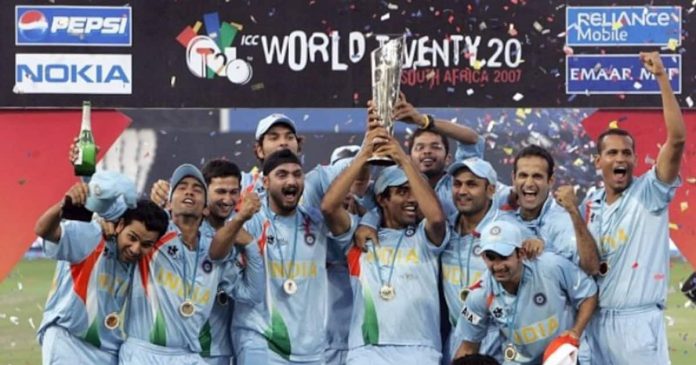On September 24, 2007, India ushered in a new era in sports history. On this day 15 years ago, the Indian cricket team won the inaugural edition of the ICC T20 World Cup. Mahendra Singh Dhoni-led team won the World Cup after 24 years. India defeated arch-rival Pakistan by 5 runs at The Wanderers in Johannesburg, South Africa. Here in this article, we have discussed on India Won the 1st T20 World Cup in detail.
India Won the 1st T20 World Cup
How it conspired?
India Innings
After winning the toss, India elected to bat first. Within the first six overs, the squad lost opener Yusuf Pathan and No. 3 Robin Uthappa. Pacer Umar Gul dismissed both Yuvraj Singh and MS Dhoni at a crucial time. Gautam Gambhir stood out with key innings of 75 off 54 balls, striking eight fours and two sixes, while Rohit Sharma’s late burst guided India to 157.
Pakistan Innings
Defending 157, India came out with all guns blazing as Pakistan was reduced to 77/6. All of their major hitters, including Shahid Afridi, Younis Khan, and Shoaib Malik, were sent back to the pavilion. But Misbah-ul-Haq just wouldn’t give up hope He began hitting Indian bowlers all over the park, bringing Pakistan within striking distance.
The Final Over Thrill
Pakistan needed 13 runs in the final over and India needed 1 wicket to win the World Cup 2007. Dhoni chose Joginder Sharma to bowl the over. It was a tricky decision and the world seemed to question it. The first delivery was a wide. Misbah smashed the second delivery of the over for a six, putting India’s chances of winning the match in jeopardy. But what happened next only brought cheers for India fans. Misbah on third delivery, that was a slower one, opted for a scoop shot on the third delivery of the over, only to give Sreesanth a simple catch.
As a result, India won the finals by five runs and walked away with the prized T20 trophy. Dhoni went on to win two more ICC trophies, the 50-over World Cup in 2011 and the Champions Trophy in 2013. The maiden victory prompted the BCCI to launch the Indian Premier League the following year.


